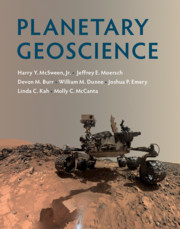Description
Planetary Geoscience
Authors: McSween, Jr Harry Y., Moersch Jeffrey E., Burr Devon M., Dunne William M., Emery Joshua P., Kah Linda C., McCanta Molly C.
The ideal textbook resource to support a one-semester capstone course in planetary processes for geoscience undergraduates.
Language: English
Subject for Planetary Geoscience:
67.54 €
In Print (Delivery period: 14 days).
Add to cart
Publication date: 07-2019
350 p. · 22.3x28.4 cm · Hardback
350 p. · 22.3x28.4 cm · Hardback
Description
/li>Contents
/li>Biography
/li>
For many years, planetary science has been taught as part of the astronomy curriculum, from a very physics-based perspective, and from the framework of a tour of the Solar System - body by body. Over the past decades, however, spacecraft exploration and related laboratory research on extraterrestrial materials have given us a new understanding of planets and how they are shaped by geological processes. Based on a course taught at the University of Tennessee, Knoxville, this is the first textbook to focus on geologic processes, adopting a comparative approach that demonstrates the similarities and differences between planets, and the reasons for these. Profusely illustrated, and with a wealth of pedagogical features, this book provides an ideal capstone course for geoscience majors - bringing together aspects of mineralogy, petrology, geochemistry, volcanology, sedimentology, geomorphology, tectonics, geophysics and remote sensing.
Preface; 1. Exploring the Solar System; 2. Toolkits for the planetary geoscientist: imaging and spectroscopy; 3. More toolkits for the planetary geoscientist: chronology, mapping, geophysics, and laboratory analysis; 4. Solar System raw materials; 5. Assembling planetesimals and planets; 6. Planetary heating and differential; 7. Unseen planetary interiors; 8. Planetary geodynamics; 9. Planetary structures and tectonics; 10. Planetary igneous activity; 11. Impact cratering as a geologic process; 12. Planetary atmospheres, oceans, and ices; 13. Planetary Aeolian processes and landforms; 14. Planetary fluvial and lacustrine landforms: products of liquid flow; 15. Physical and chemical changes: weathering, sedimentology, metamorphism, and mass wasting; 16. Astrobiology: a planetary perspective on life; 17. Integrated planetary geoscience: a case study (Mars); Epilogue: geologic processes in other Solar Systems?; Glossary; Index.
Harry Y. McSween is Chancellor's Professor Emeritus of Planetary Geoscience at the University of Tennessee, Knoxville. He holds degrees from The Citadel (B.S.), the University of Georgia (M.S.), and Harvard University (Ph.D.). His research focuses on meteorites and has resulted in the publications of hundreds of scientific papers on the subject. He has also authored three popular books on planetary science, as well as textbooks in geochemistry and cosmochemistry. He has served as co-investigator for many NASA spacecraft missions, including Mars Pathfinder, Mars Exploration Rovers, Mars Odyssey orbiter, and Dawn asteroid orbiter. McSween has been elected President of the Meteoritical Society and of the Geological Society of America and is a fellow of the American Academy of Arts and Sciences. He is the recipient of the Leonard Medal (Meteoritical Society), the J. Lawrence Smith Medal (US National Academy of Sciences), and the Whipple Award (American Geophysical Union), and is the namesake for asteroid 5223 McSween.
Jeffrey E. Moersch is Professor of Planetary Science at at the University of Tennessee, Knoxville. He holds degrees from Cornell University (B.A. and Ph.D.) and Arizona State University (M.S.). His research focuses on remote sensing, planetary surface geology, instrument development, and terrestrial analog field work. He has served on the science teams for many NASA spacecraft missions, including the Mars Exploration Rovers, Mars Science Laboratory, and Mars Odyssey. Along with Professor McSween, he originally developed the planetary geology course from which this book is derived. Professor Moersch has authored and co-authored more than eighty peer-reviewed scientific articles and book chapters, and served for five years as the Mars editor for the scientific journal Icarus.
Devon M. Burr is Associate Professor of Planetary Science at the University of Tennessee, Knoxville. She holds degrees from the United States Naval Academy (B.S), St. John's Coll
Jeffrey E. Moersch is Professor of Planetary Science at at the University of Tennessee, Knoxville. He holds degrees from Cornell University (B.A. and Ph.D.) and Arizona State University (M.S.). His research focuses on remote sensing, planetary surface geology, instrument development, and terrestrial analog field work. He has served on the science teams for many NASA spacecraft missions, including the Mars Exploration Rovers, Mars Science Laboratory, and Mars Odyssey. Along with Professor McSween, he originally developed the planetary geology course from which this book is derived. Professor Moersch has authored and co-authored more than eighty peer-reviewed scientific articles and book chapters, and served for five years as the Mars editor for the scientific journal Icarus.
Devon M. Burr is Associate Professor of Planetary Science at the University of Tennessee, Knoxville. She holds degrees from the United States Naval Academy (B.S), St. John's Coll
© 2024 LAVOISIER S.A.S.




